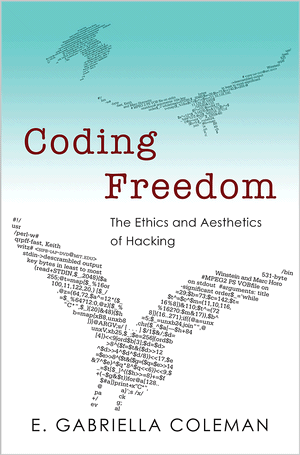Coding Freedom, by Biella Coleman
As part of Goal 2 of this blog, I'm writing a book about FOSS, specifically FOSS alternative social media. Like any good academic, I need to review the literature. I want to do so a bit more publicly than I have in the past -- hence this blog.
In fact, I've already started the process a bit: early on this blog went a bit viral thanks to my post about Scott Rosenberg's Dreaming in Code., which was linked by Hacker News. I also wrote a review of sorts of Sam Williams's Free as in Freedom, a biography of Stallman. I just so happened to finish reading that book when Stallman was reinstated to the FSF, which made my post a bit more polemical than review.
This time, I'm going to turn to a modern classic: Gabriella Coleman's Coding Freedom: The Ethics and Aesthetics of Hacking.

Coleman is a trained anthropologist, engaging in deep hanging out, and in the early 2000s she turned her attention to one of the most important FOSS projects out there: Debian. She focuses on the full range of Debian's activities, from gathering at conventions to online networking to the common conception of the self as hacker. Her analysis of conventions as lifeworlds is very powerful. As she argues, "the hacker con is a condensed, weeklong performance of a lifeworld that hackers usually build over decades of experiences and interactions connected to various media, institutions, and objects" (57). Her observation is an antidote to the idea that FOSS hackers only interact virtually -- they crave in-person meetings like any sociable human would (which is probably easier to understand in these days of Zooming and distancing).
In addition, she discusses the politics of licensing at great length, tracing the now-familiar history of proprietary software on one hand and the sharing of code (and eventual copyleft approach) on the other. And yet, which she notes the idealism of the Free Software crowd, she also documents the pragmatism of many FOSS users: "The majority of hackers I interviewed... came to free software at first merely for the sake of affordable, better-built technology and had little knowledge about the existence, much less the workings, of intellectual property law" (71). (Indeed, this echoes my own FOSS journey).
However, although people may have come to FOSS without thinking too much about the politics, Coleman also observed how pushback against sharing -- particularly the crackdown on DeCSS and the arrest of Dmitry Skylarov -- forced many FOSS users into a more political stance. I believe Coding Freedom is best known for Coleman's incisive analysis of what might be called "legal hacking," or the treatment of law as a system susceptible to being tinkered with. For example, a well-known way that FOSS advocates drew attention to the strangeness of criminalizing code was to convert DeCSS into poems and printing it on t-shirts.
My Big Takeway for Goal 2
There is a lot to draw on from Coleman's analysis. But I wonder if her work has become so influential that we take many of her arguments for granted. In some ways, she's helped create the FOSS world we find ourselves in. Read her book to see what I mean.
One area that I think is only now being addressed in FOSS -- an area I think Coleman was prescient of -- is calls for diversity and concerns about Freedom 0. One of the surprises she experienced was that both Free Software advocates and Open Source, pro-corporate advocates were largely apolitical. That is, as she discusses, they avoided Left/Right distinctions (pp 185-186). To be certain, there were the activists defending free speech, but little in the way of the left or right politics to be found among FOSS developers. She argues that this political neutrality was central to the growth of FOSS -- it turns out to be software that socialists and big corporations see great potential in.
This sort of neutrality is tied to Freedom 0, of course, the first of the "Four Freedoms" of Free Software. For example, she quotes a Debian developer, who says, "I can't control if the person using my software is racist" (187). (I've found similar sentiments among the FOSS people I have interviewed, who note their work is not activism, and it isn't political -- they're just making neutral tools that anyone can use and contribute to.)
But, as we've learned in the past decade, corporations and governments will readily adopt FOSS for unethical ends, whether it be manipulative forms of communication, the exploitation of free labor, or to monitor and incarcerate populations.
Moreover, there is currently a revolt against corporate and government surveillance and exploitation but the revolt takes many forms. The revolt against these practices can also be aided by FOSS – but it can also be unethical, with the use of FOSS for hate speech platforms being one example.
Hence, there is a call for FOSS without Freedom 0, and instead with the ability to prevent, for example, racists from using one's code. Ethical Source is one example. Another is the network power of federation (and subsequently, de-federation). In both cases there is a very clear reaction against both corporate control and Freedom 0. These projects, however, are arguably not Free Software by definition. As I think Coleman shows, the only advocacy in Freedom 0 is Freedom -- again, no ability to stop bad actors from using one's code. And, as diversity advocates are pointing out, the politics of "freedom" is often the politics of whiteness, masculinity, and economic exploitation.
Like so many other aspects of where we are now, Coleman's work anticipates this debate:
Despite their official stance on licensing, some leftists have trouble accepting the formulation of nondiscrimination lying at the heart of F/OSS legal agreements. Some express discomfort or dismay that nondiscrimination, as articulated in F/OSS licensing, bars the type of control that would allow Indymedia to keep its work from being exploited for purposes of oppression (by the military, say) or corporate profit. In this guise, they echo the Marcusian critique of liberalism’s “pure tolerance” of free speech (Marcuse 1965).
Given that my work is taking me through code to running instances of alternative social media, I must necessarily understand this debate. Coleman's work grounds the conversation, but I will need to read more. Watch this space.

Comments
For each of these posts, I will also post to Mastodon. If you have a fediverse account and reply to my Mastodon post, that shows up as a comment on this blog unless you change your privacy settings to followers-only or DM. Content warnings will work. You can delete your comment by deleting it through Mastodon.
Don't have a fediverse account and you want one? Ask me how! robertwgehl AT protonmail . com
Reply through Fediverse